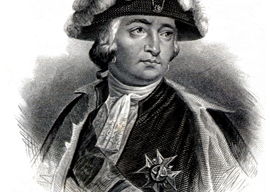
May 17, 2011

Duc d"Orléans aka Philippe Egalité
One of modernity’s toxic effects is that words now mean whatever we want them to mean. They cease being a means of communication and become an instrument of power. Lewis Carroll realized this fact:
“When I use a word,” Humpty Dumpty said in rather a scornful tone, “it means just what I choose it to mean”neither more nor less.”
“The question is,” said Alice, “whether you can make words mean different things.”
“The question is,” said Humpty Dumpty, “which is to be master”that’s all.”
Modern politicians and “brand builders” both use language in that unreal way”the former to gain power over the electorate, the latter over the market. And the unreality starts with the word “brand.”
“Brand,” with its “personality” matched to the “market profile,” is a modern invention. Branding has little to do with product characteristics because the public has been house-trained to think in terms of brands, not products. A pub-crawler selects a brand of lager not because it’s necessarily the best, but because the “brand builders” have activated the correct response mechanisms. What those mechanisms are differs from brand to brand, but only superficially. What matters aren”t semantics but semiotics; not substance but form; not reality but make-believe.
Similarly, modern politics have practically nothing to do with reality, a fact that is reflected in the words used to describe political concepts. If even the names of parties mean nothing these days, then it’s little wonder that the modern political process almost entirely bypasses reason, in whose name it was concocted in the first place.
Instead politicians follow the same logic and share the same techniques as marketers. Politicians are relying ever more on the sort of focus-group research that has put marketers in such good stead. A marketer who wishes to include some latent appeal to reason will be helped by an elaborate code frowning upon lies but countenancing more subtle deception.
The situation in politics is even graver than in commerce because there are few legal restrictions on what a politician can promise. Unlike a marketer, a politician isn”t prevented by law from telling a lie, such as issuing a promise he has no way (or intention) of keeping. He may suffer for that in the next election, but in all likelihood he won”t. The electorate is like a market: short on memory, long on the desire to see the game played by the rules. And veracity isn”t one of the rules.